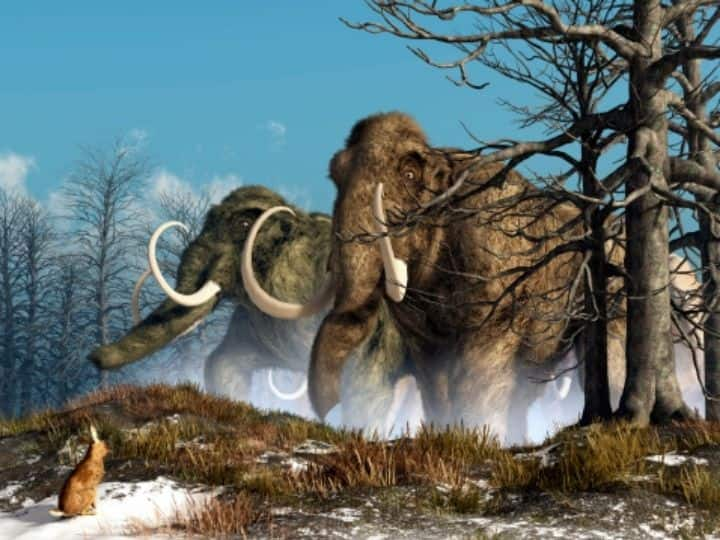Brawn Before Brains: How Mammals Survived In Post-Dinosaur World
After the reign of dinosaurs came to an end, the size of mammals' brains decreased, compared to their body weight. They did so to increase their survival chances once dinosaurs had become extinct.

New Delhi: An international team of researchers have found that prehistoric mammals bulked up, rather than developing bigger brains. The mammals did so to increase their survival chances once dinosaurs had become extinct.
The findings were recently published in the journal, Science.
Dinosaurs became extinct about 65 million years ago, at the end of the Cretaceous Period, due to a catastrophic asteroid impact. During the first 10 million years after dinosaurs' extinction, mammals prioritised boosting their body size to adapt to radical shifts in the make-up of Earth's animal kingdom, the study said.
After the reign of dinosaurs came to an end, the size of mammals' brains decreased, compared to their body weight, the study found. Earlier, scientists thought that mammals' relative brain sizes generally increased over time, following the extinction of dinosaurs in the catastrophic asteroid impact.
How Did Mammalian Evolution Occur?
Mammals have the largest ratio of brain to body size among vertebrates. Birds and mammals have undergone remarkable encephalization, in which brain size has increased without corresponding changes in body size. Encephalization is a concept which implies an increase in brain size relative to body size, and evolutionary time. In other words, mammals are the most encephalized vertebrates, with the largest brains relative to body size.
It has been believed that the relationship between brain and body sizes emerged early on in mammalian evolution, with enlarging brains leading the way into new and diverse forms.
However, the study authors looked at encephalization rates across mammals beginning in the Paleocene, and found instead that body sizes were the first to increase. This allowed for niche filling after the extinction of dinosaurs.
The brain size began to increase only later, in the Eocene Epoch, which lasted from about 56 to 33.9 million years ago. This was likely driven by a need for greater cognition in increasingly complex environments, leading to the highly cephalized brains of today, including those of humans, the authors noted in the study.
Early Mammals Increased Their Brain And Body Sizes At Different Times
Several findings have been made about the evolution of the brains of modern-day animals. However, until now, it has been unclear how the mammalian brains developed in the first few million years following the mass extinction.
Researchers from the University of Edinburgh, Scotland, have tried to solve the mystery by performing computed tomography (CT) scans on newly discovered fossils from the 10-million-year period after the extinction. This period is known as the Paleocene Epoch.
The researchers used CT scans of newly discovered Paleocene fossils to show that contrary to the convention that mammal brains have steadily enlarged over time, early placental mammals initially decreased their relative brain sizes because body mass increased at a faster rate. Placental mammal is any member of the mammalian group characterised by the presence of a placenta, which facilitates exchange of nutrients and wastes between the blood of the mother and that of the foetus.
The scientists found that the relative brain sizes of mammals at first decreased because their body sizes increased at a much faster rate, the study said.
The animals were heavily dependent on their sense of smell, and their vision and other senses were less well-developed, results of the scans suggested.
This implies that it was initially more important to be big than highly intelligent in order to survive in the post-dinosaur era, according to the researchers.
Early members of modern mammal groups such as primates began to develop larger brains and a more complex range of senses and motor skills, during the Eocene Epoch, around 10 million years after the extinction of dinosaurs.
The authors noted in the study that the development of larger brains would have improved the survival chances of mammals at a time when competition for resources was much higher.
Are Big Brains Always Better To Survive Extinction?
According to the researchers, the idea that big brains are always better to invade new environments or survive extinctions is misleading.
Dr Ornella Bertrand, the lead author of the study, said that large brains are "expensive to maintain, and if not necessary to acquire resources, would have probably been detrimental for the survival of early placental mammals in the chaos and upheaval after the asteroid impact", according to a statement issued by University of Edinburgh.
Although it is easy to assume that big brains helped early humans outlast the dinosaurs and survive extinction, that was not the case, the researchers said.
Professor Steve Brusatte, senior author of the study, said that the mammals that usurped the dinosaurs were "fairly dim-witted, and only millions of years later did many types of mammals develop bigger brains as they were competing with each other to form new ecosystems."
Since many mammals were competing with each other to form new ecosystems, they developed bigger brains, millions of years after the extinction of dinosaurs.
There are only a few places where complete skulls and skeletons of mammals living immediately after the mass extinction of dinosaurs can be found. The badlands of northwestern New Mexico are among those regions.







































